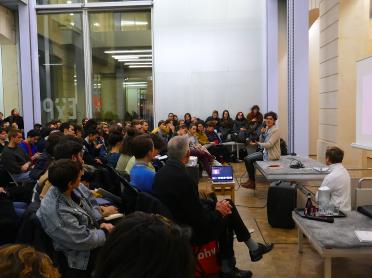LGBTQI art and commitment: making history(s)
Thursday 14 Nov 2019 from 6:30pm to 8pm
Free admission

Vue de la rencontre Art et Engagement LGBTQI : faire histoire(s)
On the occasion of the publication of the book "Pour une esthétique de l'émancipation: construire les lignes d'un art queer" (éditions B42)
Isabelle Alfonsi talks with Renaud Chantraine (Collectif Archives LGBTQI), about the need today to make history and produce living archives by linking feminist and LGBTQI militancy to artistic practices.
Far from rereading art history by anachronistically applying the term "queer", used positively in militant circles since the late 1980s, "Pour une esthétique de l'émancipation" seeks to show how the writing of art history has reduced the importance of artists' political and emotional commitments and rendered inoperative the social impact of their works.
By imagining new friendships between artists from the past, Isabelle Alfonsi brings out a feminist and queer lineage for contemporary art. Twentieth-century artistic practices are thus placed in the context of the militancy for the defense of human rights and the formation of a radical feminist and anti-capitalist critique. Claude Cahun and Michel Journiac cross-reference the history of American minimalism, seen through Lynda Benglis, Lucy Lippard or Yvonne Rainer. The wars of representation waged during the AIDS crisis are read through the prism of Felix Gonzalez-Torres' works, José E.'s concept of disidentification. Muñoz and the cultural activism of the Boy/Girl with Arms Akimbo group in San Francisco in the 1980s.
Far from rereading art history by anachronistically applying the term "queer", used positively in militant circles since the late 1980s, "Pour une esthétique de l'émancipation" seeks to show how the writing of art history has reduced the importance of artists' political and emotional commitments and rendered inoperative the social impact of their works.
By imagining new friendships between artists from the past, Isabelle Alfonsi brings out a feminist and queer lineage for contemporary art. Twentieth-century artistic practices are thus placed in the context of the militancy for the defense of human rights and the formation of a radical feminist and anti-capitalist critique. Claude Cahun and Michel Journiac cross-reference the history of American minimalism, seen through Lynda Benglis, Lucy Lippard or Yvonne Rainer. The wars of representation waged during the AIDS crisis are read through the prism of Felix Gonzalez-Torres' works, José E.'s concept of disidentification. Muñoz and the cultural activism of the Boy/Girl with Arms Akimbo group in San Francisco in the 1980s.
Née en 1979, Isabelle Alfonsi est diplômée de l’Institut d’Etudes Politiques de Paris et de University College à Londres. En 2009, elle a créé Marcelle Alix, galerie d’art contemporain située à Belleville, qu'elle co-dirige avec Cécilia Becanovic. Elle élabore depuis 2014 des conférences sur les lignées d’un art queer contemporain, dont certaines ont été performées en drag. Son ouvrage sur le sujet, "Pour une esthétique de l’émancipation", est paru aux éditions B42, Paris, en septembre 2019.
Renaud Chantraine a étudié l’histoire de l’art et la muséologie à l’École du Louvre, avant de commencer, en 2016, une thèse d’anthropologie à l’EHESS. En s’appuyant sur des formes d’expériences militantes (Collectif Archives LGBTQI à Paris, Mémoire des sexualités à Marseille) et institutionnelles (Mucem), ses recherches s’attachent aux enjeux de transmission des mémoires LGBTQI et de la lutte contre le VIH/sida.

